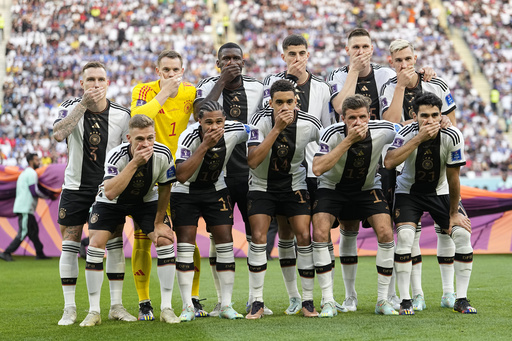
BERLIN — The German soccer team is shifting its focus from political statements to achieving success on the field. Coach Julian Nagelsmann emphasized the importance of concentrating solely on gameplay, suggesting that political gestures should take a backseat. He articulated that the experience in Qatar during the 2022 World Cup made clear that engaging with numerous political issues can be detrimental to team cohesion.
“The situation in Qatar has highlighted that we’ve learned a lot, and we ought to learn even more,” Nagelsmann stated during an interview with broadcaster NTV on Tuesday. “That’s why we have specialists for these matters who are capable of addressing them. Our role is in sports, and that’s where our focus should remain.”
The German squad faced disappointment during the World Cup held in Qatar, where their campaign was marred by ongoing criticisms regarding the host nation’s human rights record. Some German supporters even called for a boycott of the tournament, with several pubs in Berlin and other locations choosing not to air the matches. Throughout the event, both players and officials took stands for equality and inclusivity through various gestures.
Notably, German minister Nancy Faeser showcased a “One Love” armband alongside FIFA president Gianni Infantino, while players positioned their hands over their mouths for the team’s photo shoot as a protest against FIFA’s opposition to the armband, which many interpreted as a direct criticism of Qatar.
Reflecting on the experiences in Qatar, team captain Joshua Kimmich recently shared similar sentiments to Nagelsmann, expressing regret over the team’s protests during the tournament. Kimmich remarked that their political expressions detracted from the overall enjoyment of the event. He voiced the belief that it is not their responsibility to engage in political debates.
The topic of human rights continues to be prominent as Saudi Arabia is expected to be officially announced as the host for the 2034 World Cup at an upcoming FIFA congress on December 11. They stand as the only candidate for the role, and recent reports suggest that the German soccer federation plans to support their bid, despite backlash from various trade unions and human rights organizations such as Amnesty International and Human Rights Watch.
However, Nagelsmann maintains that these human rights considerations should not pertain to the team’s priorities. He remarked, “Ultimately, it’s not my role as a coach, nor the team’s involvement that dictates decisions about World Cup hosts. Those choices are made in different realms and don’t heavily intersect with our responsibilities. We simply need to prepare for the tournament, no matter where it may be held,” he stated. “It’s clear that there are numerous challenges in Saudi Arabia, but assessing them isn’t within our purview.”
